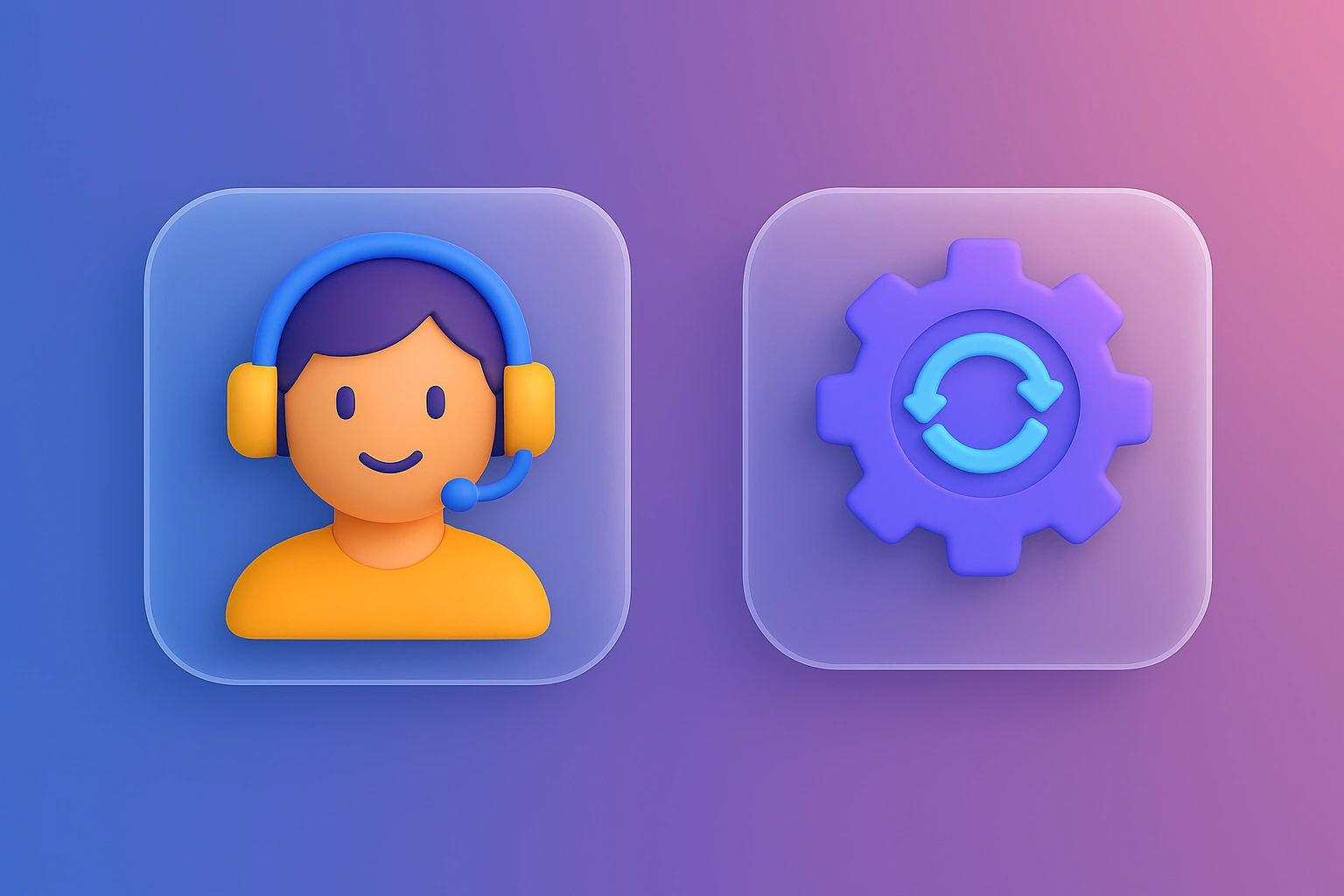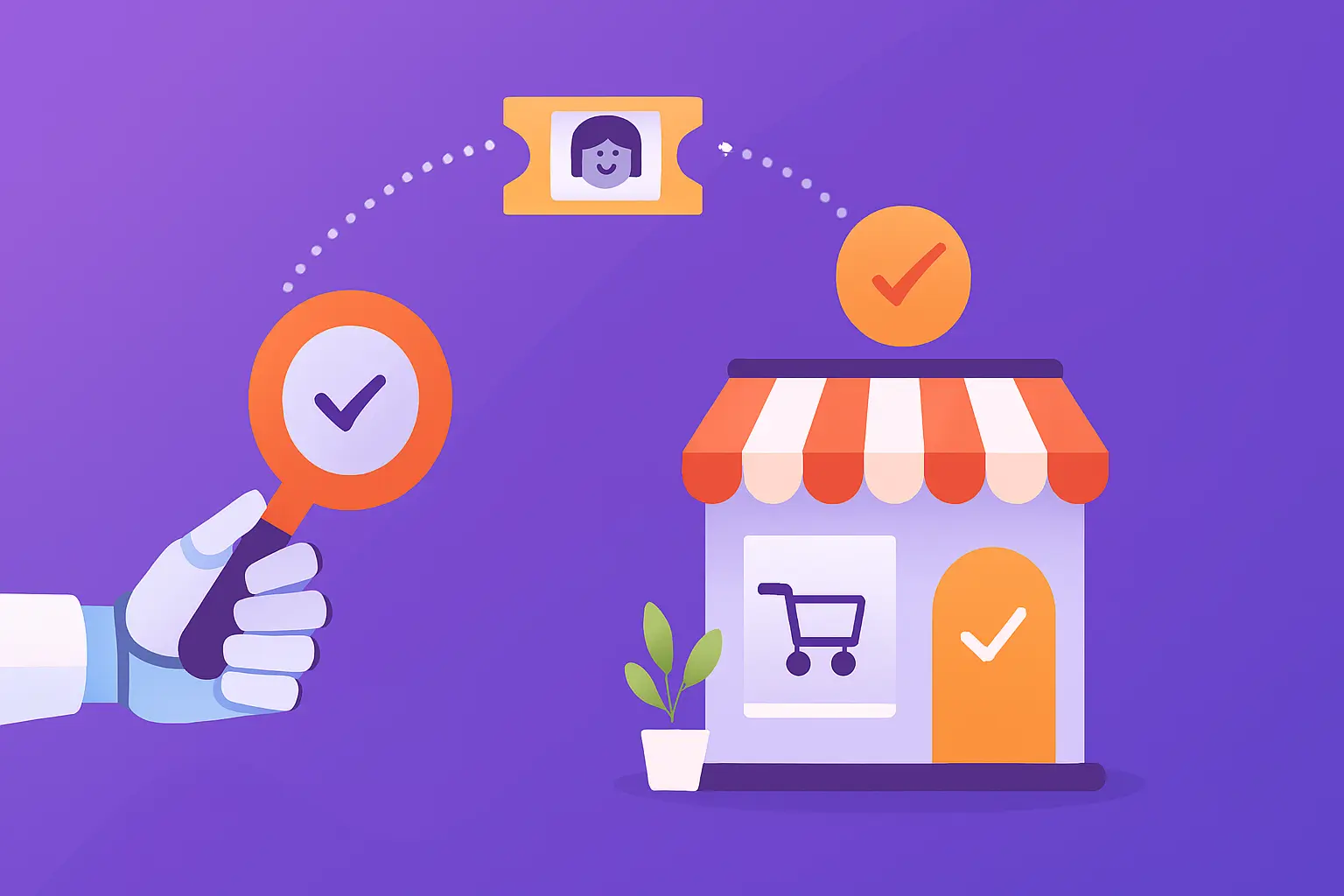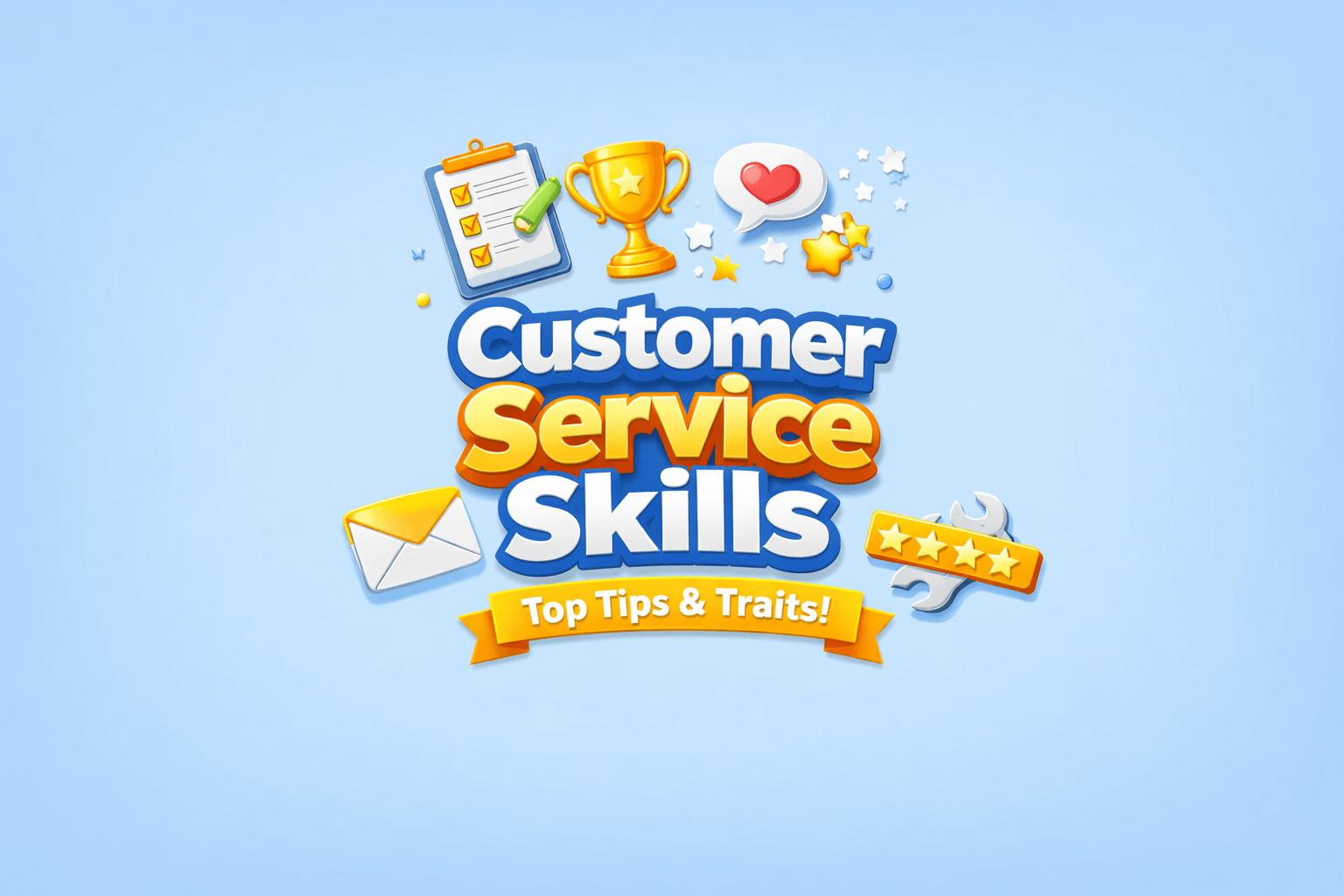7 Best Customer Service Software for Small Businesses (2026)
- February 16, 2026
- 11 mins read
- Listen
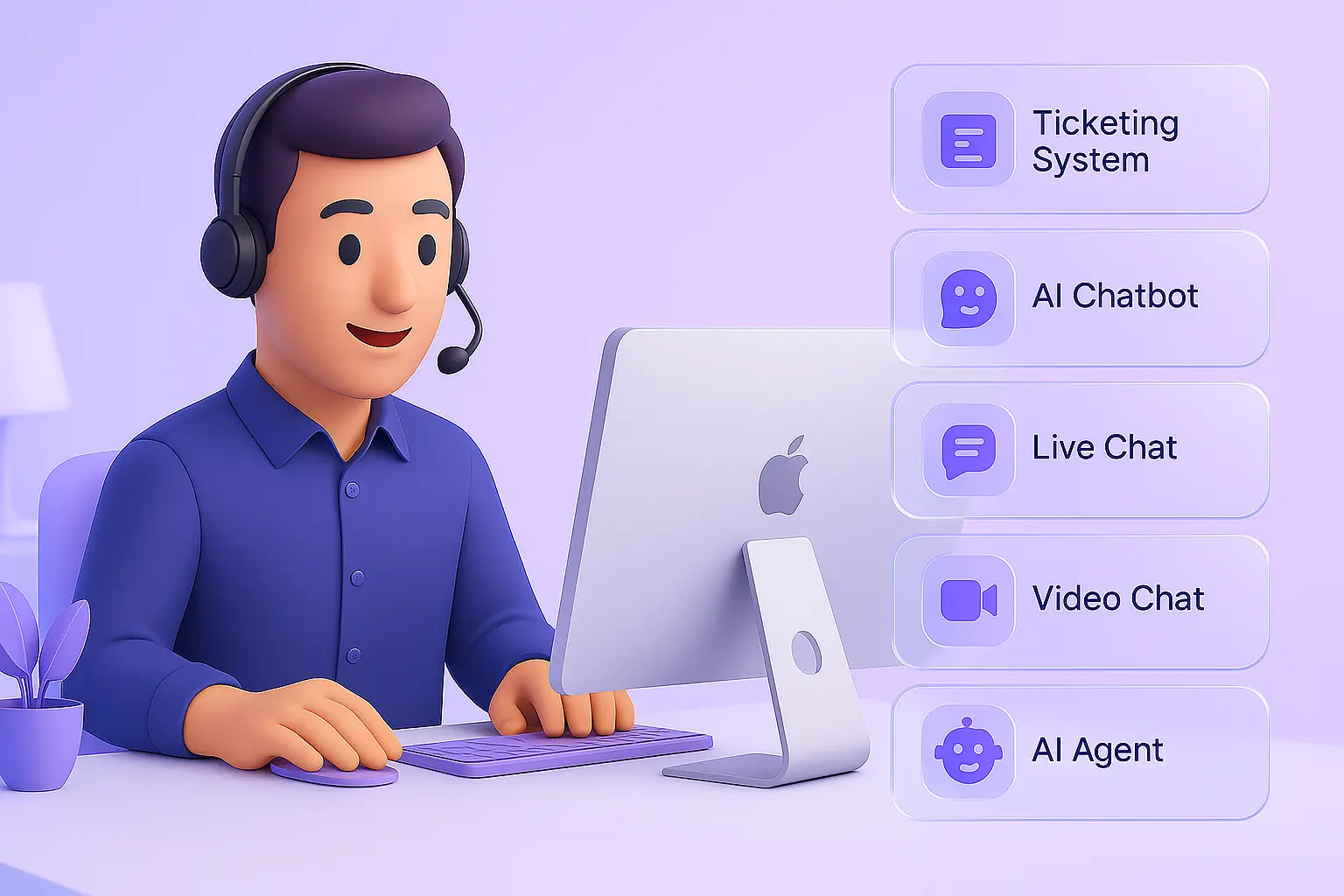
90% of customers say getting an immediate response is important when they have a support question, according to Hubspot. They also stated that 60% will stop buying from a business because of poor customer service. For small businesses, this makes investing in the right customer service software more than just a convenience; it’s a must.
When you’re handling sales, operations, marketing, and support, often with just one or two people, it’s easy for customer messages to slip through the cracks. But while it might feel like a minor delay internally, to your customer, it’s often the moment they lose trust and move on.
Customer service software that caters to small businesses solves this by bringing all your conversations, live chat, email, social media, and help desk tickets into one organized place. You can respond faster, track issues better, and create a more reliable customer experience, even with limited time and resources.
In this blog, we’ll explore what customer service software is and a curated list of customer service tools for your small business.
What is customer service software?
Customer service software is a tool that allows businesses to manage and respond to customer queries from one central platform, across email, live chat, social media, and more. It helps teams track conversations, assign tasks, and resolve issues efficiently.
For small businesses, this software acts like a virtual help desk. It organizes every customer interaction in one place, so nothing gets missed. It reduces the time spent jumping between platforms, helps teams stay on top of customer needs, and improves customer experience even with limited staff or resources.
How to choose a small business customer service solution?
When choosing the right customer service software for your small team, look for tools that offer features to simplify support, not complicate it. Here are some must-haves:
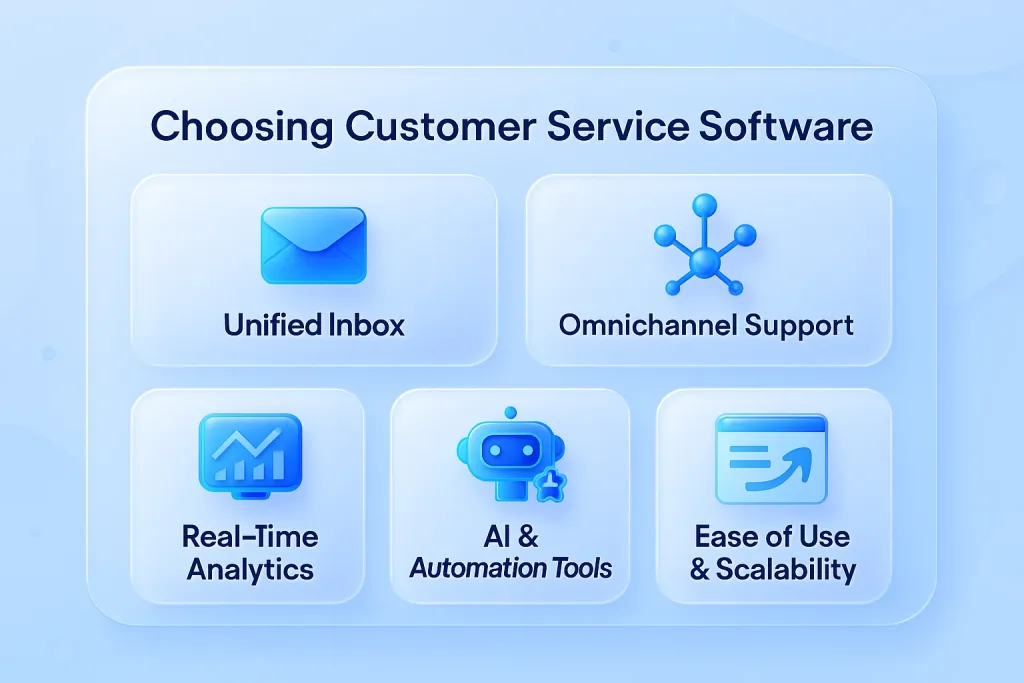
- Unified inbox: Manage all customer conversations, email, live chat, and social media from a single place.
- Omnichannel support: To provide an omnichannel customer service, you need to ensure seamless communication across channels like chat, email, messaging apps, and more.
- Real-time analytics: Get instant insights into response times, ticket volumes, and agent performance to improve service quality.
- AI & automation tools: Look for AI-powered chatbots, automated ticket routing, and smart suggestions to save time.
- Ease of use & scalability: The tool should be easy for your team to learn and grow with as your business scales.
Top 7 customer service tools for small businesses
| Rank | Customer Service Tool | Core Features (Top 4–5) | Starting Price (2026) | Scalability & Limits | Best For |
| 1 | REVE Chat | Omnichannel Inbox (email, chat, social, WhatsApp), AI Chatbot & Copilot (85%+ deflection), Ticketing & Automation, Live Chat Handoff, 40+ Integrations (Shopify, HubSpot, etc.), Sentiment Analysis, Multilingual | $0 Free plan forever (1 seat, 50 sessions) or $14.99/mo Starter base (1 seat, 500 chatbot sessions, $0.039 extra) – Growth $59.99 base (unlimited live chats), Enterprise $291.99 base | Handles high volume (100,000+ sessions on higher tiers), no per-query fees, low overages, no-code setup | Small businesses wanting affordable AI-driven omnichannel support, ticketing, and live chat without surprises or hidden costs |
| 2 | Freshdesk | Email/Social Ticketing, Knowledge Base, AI Automation, Team Collaboration, Customer Portal | From $0 (free tier) or ~$15/agent/mo (Growth) | Good for mid-volume, per-agent scaling, free basics viable for small teams | Budget-conscious teams needing simple ticketing + self-service |
| 3 | Zendesk | AI-Powered Ticketing, Omnichannel (email, chat, voice, social), Dashboards, Knowledge Management | From ~$19–$55/agent/mo (Suite entry) | Strong for growing teams, per-agent adds up, reliable high-volume handling | Teams prioritizing AI tools and compliance in customer support |
| 4 | Help Scout | Shared Inbox, AI Replies, Knowledge Base Beacons, Email-to-Ticket, Reporting | From $25/user/mo | Simple per-user pricing, scales cleanly for small-mid teams | Human-centric support teams focused on email & relationships |
| 5 | Zoho Desk | Multi-Channel Ticketing, Lead Scoring, Analytics, Zoho CRM Sync, Automation | From $0 (free up to 3 agents) or ~$7–$14/agent/mo | Affordable per-user, deep Zoho ecosystem integration | $0 Free plan forever (1 seat, 50 sessions) or $14.99/mo Starter base (1 seat, 500 chatbot sessions, $0.039 extra) – Growth $59.99 base, Enterprise $291.99 base |
| 6 | HubSpot Service Hub | Ticketing, Live Chat, Knowledge Base, Automated Workflows, CRM Integration | $0 (free with HubSpot CRM) or ~$20/seat/mo+ (Starter) | Unlimited in free tier (tied to CRM), scales via paid hubs | Inbound-focused teams using HubSpot for free unlimited basics |
| 7 | Gorgias | Shopify-Native Ticketing, Order Automation, AI Rules, Multi-Channel Support | From ~$60/mo (entry) | E-commerce-heavy scaling, higher entr,y but strong integrations | Small businesses already in the Zoho suite or needing analytics |
Choosing the right customer service platforms can feel overwhelming, especially with so many options available. To make your decision easier, we’ve curated a list of the 7 best customer service platforms tailored specifically for small businesses.
Before we dive into each tool’s details, here’s a quick comparison table to help you evaluate them at a glance.
1. REVE Chat
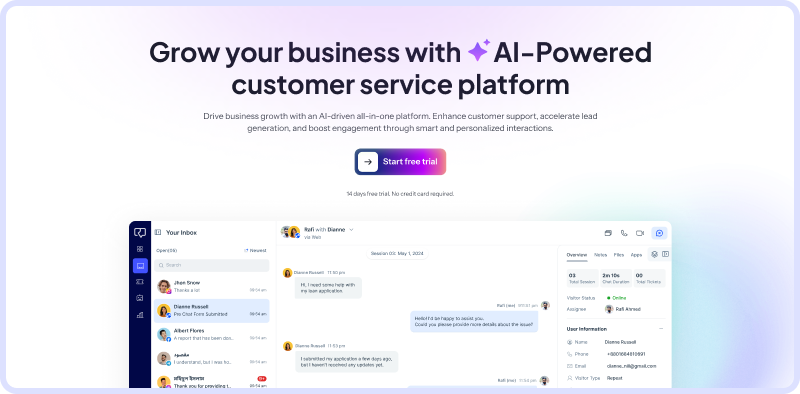
REVE Chat is a reliable customer service platform for small businesses that are looking for affordable omnichannel support with live chat, AI chatbots, ticketing, video calls, and co-browsing in one simple dashboard.
Tailored specifically for small teams, it helps businesses deliver fast, personalized, and human-like support across channels like websites, Facebook, WhatsApp, Telegram, and more, without needing a big team or complex setup.
Key features:
- Omnichannel messaging (live chat, social, bots)
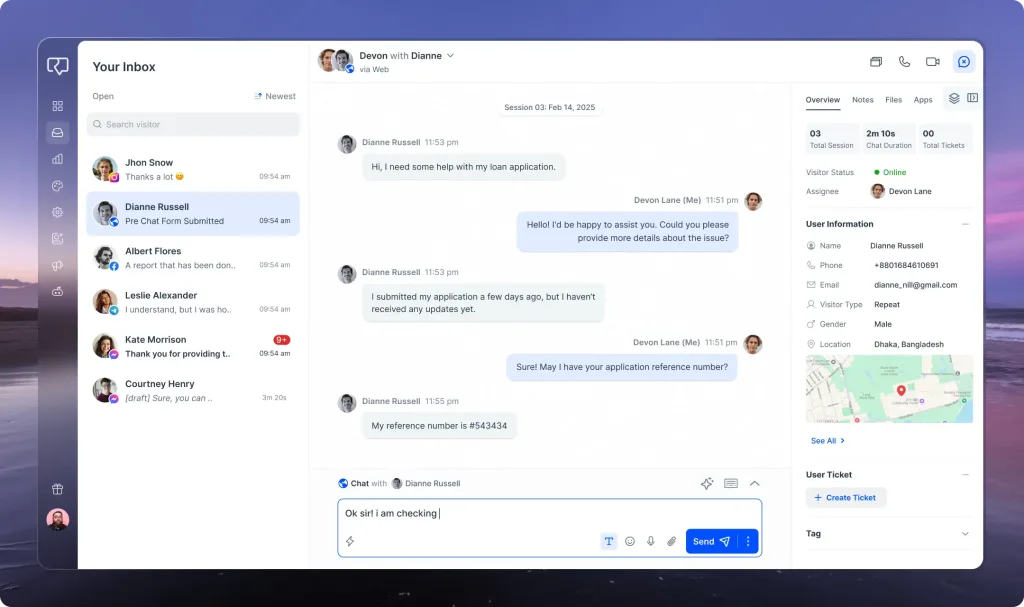
- Live chat with proactive triggers and visitor monitoring
- AI-powered chatbots for automating FAQs and lead qualification
- Built-in ticketing system to track, assign, and resolve customer issues
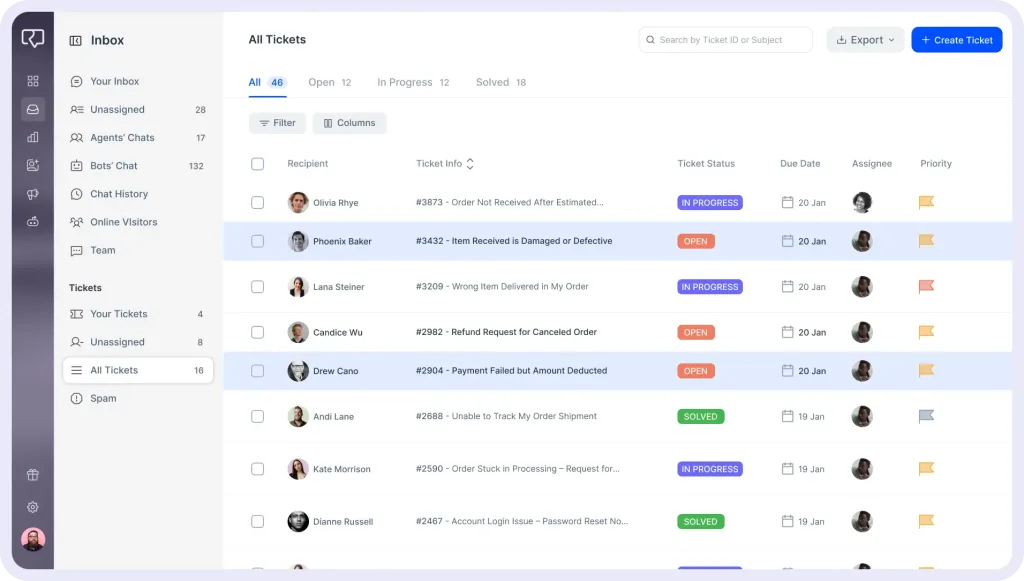
- Proactive chat triggers to engage visitors and boost conversions
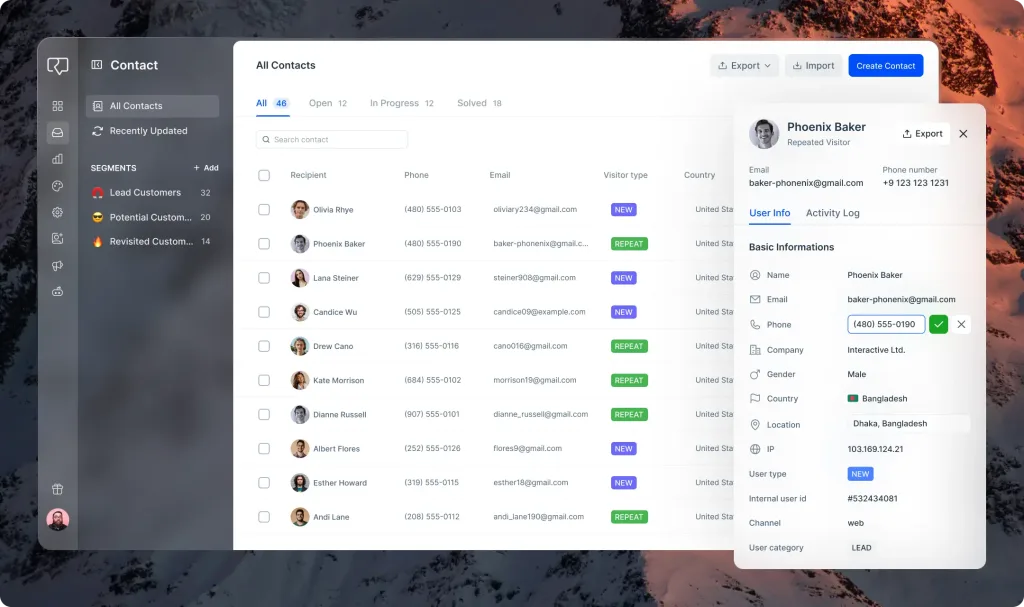
- Co-browsing & video chat for real-time, hands-on customer assistance

- Smart routing and canned responses for faster resolutions
- In-depth analytics and customer tracking for performance insights
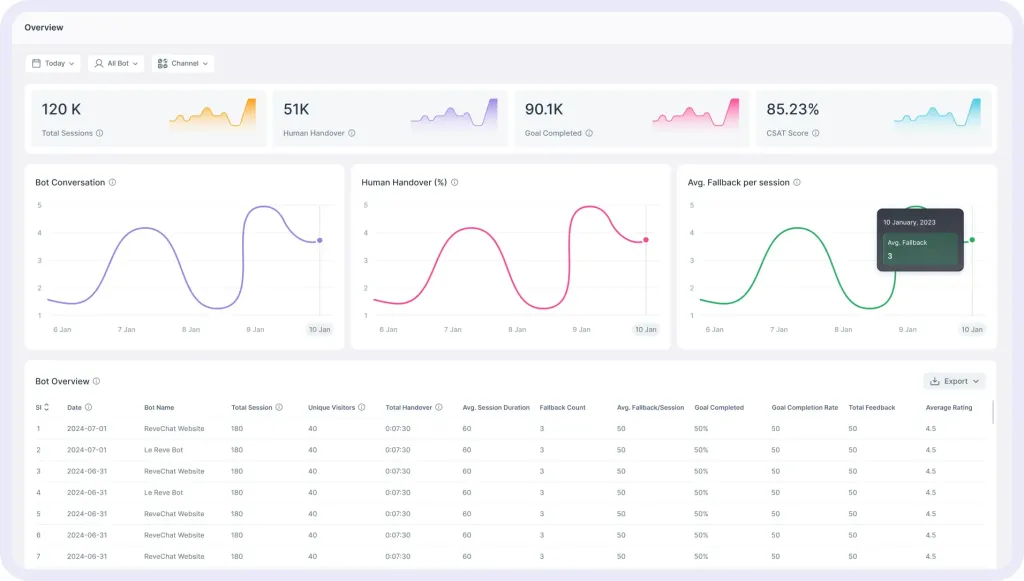
Pros
- Extremely intuitive UI, perfect for small teams with no tech support
- Full-featured even in lower-tier plans
- Human + AI support balance (you can blend both)
- Easy to deploy on websites, Facebook, WhatsApp, and mobile apps
Cons
- The knowledge base feature is limited compared to enterprise tools
Pricing
- REVE Chat offers a $0 Free plan forever (1 seat, 50 chatbot/live sessions, 10 AI credits) and starts paid at $14.99/mo base for Starter (1 seat, 500 chatbot sessions, $0.039 extra). Higher Growth ($59.99 base with unlimited live chats) and Enterprise ($291.99 base) tiers scale affordably, plus a 14-day trial with enterprise features—no hidden per-query or heavy agent fees.
2. Freshworks
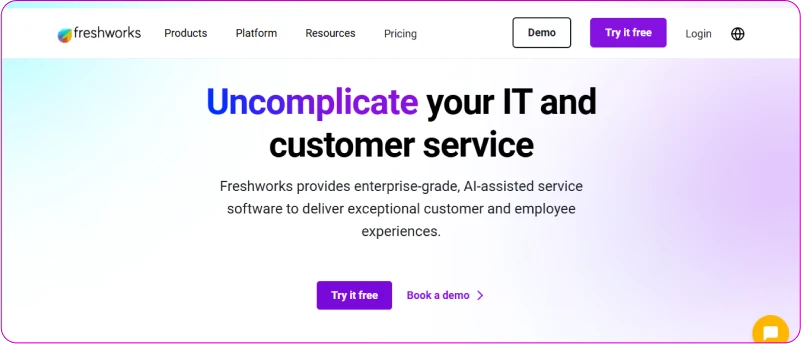
Freshdesk is a modern helpdesk solution from Freshworks, great for growing businesses that want to automate and scale customer support. It’s packed with AI tools like Freddy AI, automations, SLA management, and a clean ticketing system.
Key features
- Ticketing automation and scenario rules
- Freddy AI for suggestions and responses
- Omnichannel inbox (chat, email, phone, social)
- Self-service portal builder
Pros
- Offers a forever-free plan
- Scales well with advanced AI features
- Easy-to-use UI for non-tech teams
Cons
- Advanced features are locked in higher plans
- Some limitations in chatbot customization
Pricing
- From $0 (free tier) or ~$15/agent/mo (Growth)
3. Zendesk
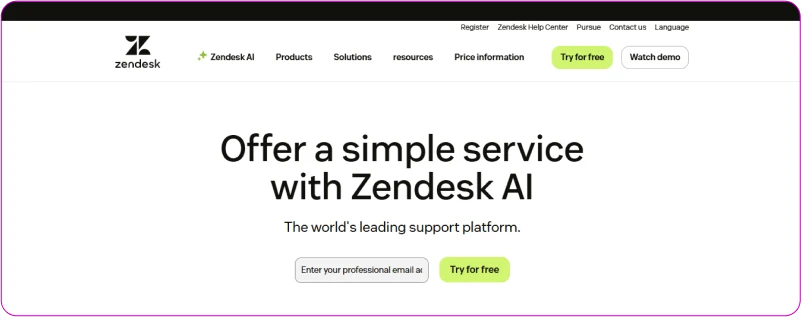
Zendesk is an enterprise-level customer service platform with advanced tools and AI-powered automation, suitable for larger teams or complex workflows. Though more expensive, it offers a comprehensive suite with over 1,000 integrations.
Key features
- Advanced ticketing and workflow automation
- AI bots and Answer Bot for self-service
- SLA rules, macros, and triggers
- Integrates with CRMs, Shopify, Slack, etc.
Pros
- Highly customizable and scalable
- Powerful analytics and dashboards
- Trusted by enterprise brands
Cons
- Expensive for small businesses
- Setup and configuration can be overwhelming
Pricing
- From ~$19/agent/mo (Support Team/entry).
4. Zoho Desk

Zoho Desk is part of the Zoho suite and works best for businesses already using Zoho CRM or other Zoho apps.
It’s heavily ticket-centric, offering workflow automation, SLA tracking, and multichannel support.
Key features
- Contextual ticketing with CRM integration
- AI assistant Zia for suggestions and automation
- Custom workflows and escalations
- Help center and community forum builder
Pros
- Deep integration with the Zoho ecosystem
- Solid for structured ticketing needs
- Affordable for small teams
Cons
- Not very intuitive for new users
- Weak chatbot and proactive chat options
Pricing
- From $0 (free up to 3 agents) or ~$14–$20/agent/mo (Standard/entry).
5. LiveAgent
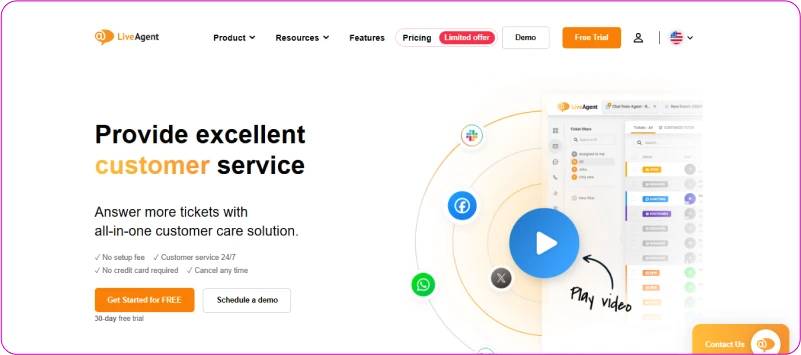
LiveAgent is a customer support tool for businesses looking for multi-channel help desk functionality. It combines ticketing, live chat, email, and call center features, ideal for businesses that want everything in one place without spending too much.
Key features
- Ticketing system with automation
- Built-in call center and IVR
- Live chat with real-time visitor monitoring
Pros
- Free plan available with core tools
- Highly affordable and scalable
- Strong reporting dashboard
Cons
- The interface feels outdated to some users
- Lacks proactive messaging features
Pricing
- From ~$15/agent/mo (entry).
6. Intercom

Intercom is best known for its conversational support tools, combining chat, email, and automation to drive proactive customer engagement. It suits SaaS or digital-first businesses looking to boost user onboarding and retention via messaging.
Key features
- AI-powered chatbots and resolution bots
- Product tours and outbound campaigns
- Inbox, help center, and analytics
- Strong mobile and multilingual support
Pros
- Excellent for proactive communication
- Sleek interface and great user experience
- Powerful automation features
Cons
- Pricing grows quickly with usage
- Can be complex for non-tech users
Pricing
- From ~$29/seat/mo.
7. Help Scout
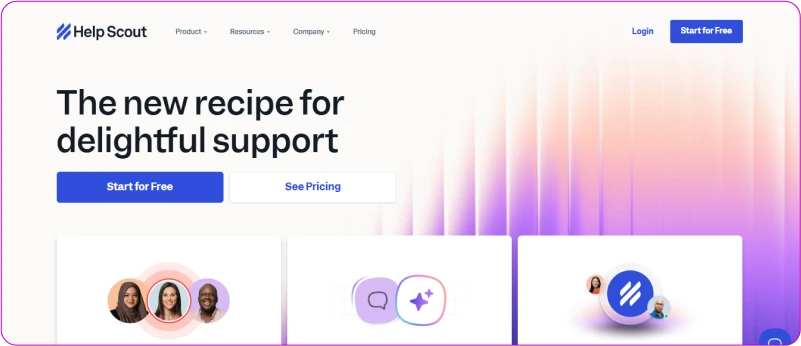
Help Scout is a great option for small businesses focused on simple, email-driven support. It offers shared inboxes, docs, and chat in one clean interface.
Key features
- Shared inbox with collision detection
- Live chat and knowledge base
- Customer profiles and reporting
- Lightweight automation and workflows
Pros
- Clean, minimal UI ideal for small teams
- Easy to set up and use
- Great customer support
Cons
- Limited live chat capabilities
- Fewer integrations compared to bigger platforms
Pricing
- From $25/user/mo (Standard).
What are the benefits of using a customer service solution for small businesses?
Customer service software has several benefits for small businesses, including enhanced customer experience, improved support efficiency, customer retention, and more. 93% of customers are likely to make repeat purchases with companies that offer excellent customer service.
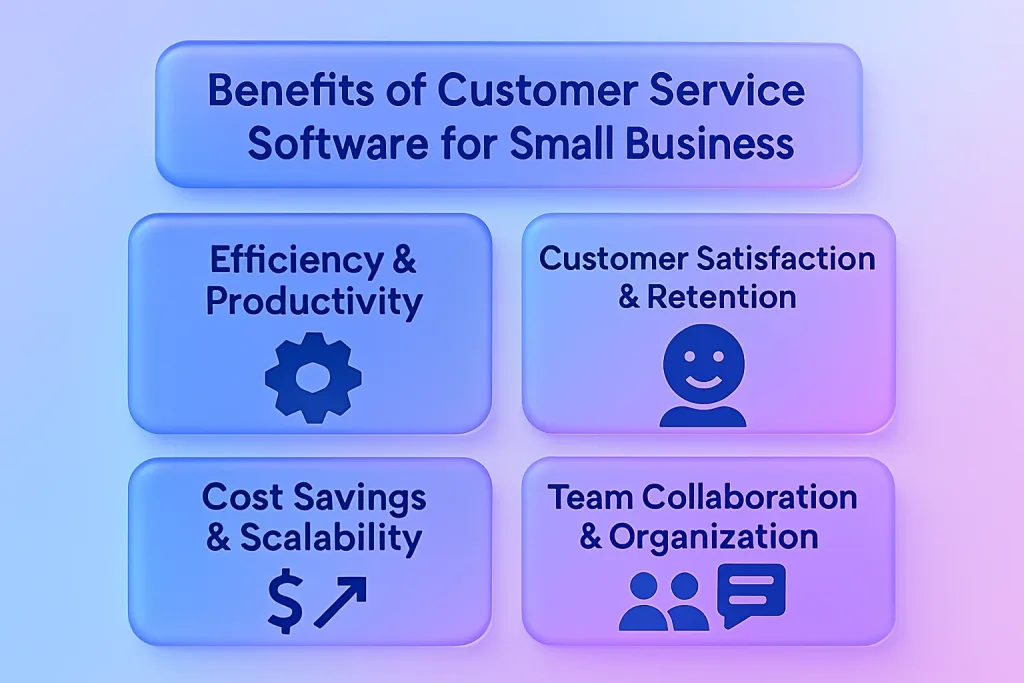
Efficiency & productivity
One of the major benefits of customer service software for small businesses is that it boosts efficiency and productivity by creating automated workflows, providing a unified inbox, and more.
- Automated workflows: By using customer service solutions, you can reduce repetitive work by automating ticket routing, follow-ups, and canned responses. This saves hours and improves consistency.
- Time savings: If you have fewer resources and a small team, you can save 5-10 hours per week and increase agent productivity by up to 29%.
Customer satisfaction & retention
Another key benefit of small business customer service platforms is that they improve customer satisfaction and retention by providing faster responses, round-the-clock services, and personalized experiences.
- Faster response times: Tickets are automatically sorted and assigned, so nothing gets missed, and customers receive replies faster.
- 24/7 availability: AI-powered chatbots and self-service options allow you to support customers even outside business hours.
- Personalized experiences: With full customer history and context, agents can offer tailored support that builds trust and loyalty.
Cost Savings & scalability
Customer service software helps small businesses reduce support costs and scale operations by automating tasks and managing more inquiries without hiring additional staff.
- Handle more with fewer agents: Automation and self-service features reduce the need to hire additional staff.
- Flexible growth: Most platforms let you scale your plan as your customer base grows.
- Lower cost per interaction: Compared to manual support systems, automated helpdesks reduce support costs significantly.
Team collaboration & organization
It improves team collaboration by assigning clear ownership, organizing conversations, and centralizing knowledge for faster, more consistent support.
- Clear ownership: Assign tickets, set priorities, and avoid duplicate responses with role-based access and task tracking.
- Internal notes & tags: Keep conversations organized with private notes and ticket categorization.
Conclusion
Finding the right customer service software can make or break how your small business connects with its customers. From managing multiple support channels to offering quick, consistent, and personalized responses, the right tool helps you do more with less.
We’ve explored seven top platforms, each offering unique strengths. Whether you’re focused on affordability, AI automation, or ticketing systems, there’s a solution tailored to your needs. If you’re still weighing your options, here’s a quick summary to help you choose the right platform based on your business needs:
- REVE Chat is best for small teams that need a complete, easy-to-use solution with live chat, AI chatbots, co-browsing, ticketing, and omnichannel messaging, all in one dashboard.
- Zoho Desk is a solid option for businesses already using Zoho apps and looking for strong ticket management with CRM integration.
- Freshdesk is great for scaling businesses that want to automate support workflows and manage higher ticket volumes with AI.
Start delivering better support today. Try REVE Chat free and see the difference it makes for your business.
Frequently Asked Questions
Customer service software helps businesses centralize, track, and resolve customer inquiries across email, chat, phone, social media, and self-service channels. It streamlines support interactions, automates repetitive tasks, and provides agents with context to deliver fast, consistent, and informed service.
Pricing usually follows one of these models:
- Subscription-based: Monthly or annual fee per user/support agent
- Tiered pricing: Varying features at different price levels
- Pay‑as‑you‑go: Fees based on usage are ideal for occasional support needs
Choose a model that fits your budget and expected ticket volume.
While a help desk focuses on ticket logging, assignment, and resolution, customer service software is broader; it typically includes live chat, knowledge bases, AI tools, omnichannel messaging, reporting, and CRM integration. All help desks are customer service tools, but not all customer service tools are just help desks.
No. A CRM (Customer Relationship Management) tool is designed to track sales, contacts, and marketing interactions. Customer service software, on the other hand, manages support inquiries and issue resolution. While they overlap, they serve different purposes, and integrating the two gives agents full visibility.
Any business dealing with customer questions, complaints, or post-sale support, even on a small scale, needs a solution beyond email. It’s especially useful for:
- E-commerce brands handling diverse inquiries across channels
- SaaS or subscription-based companies managing ongoing support
- B2B and service-oriented businesses that manage complex customer relationships


